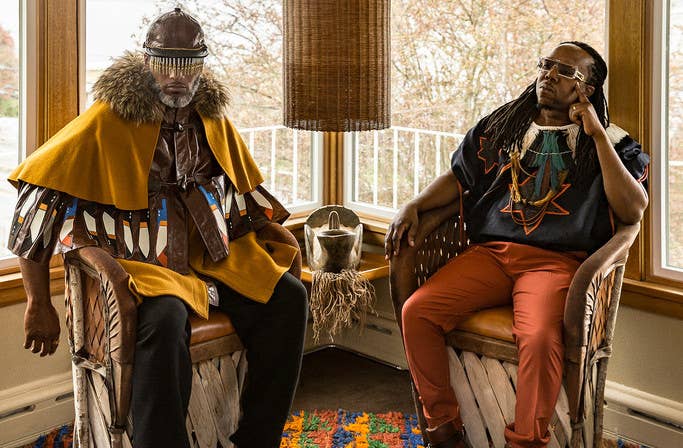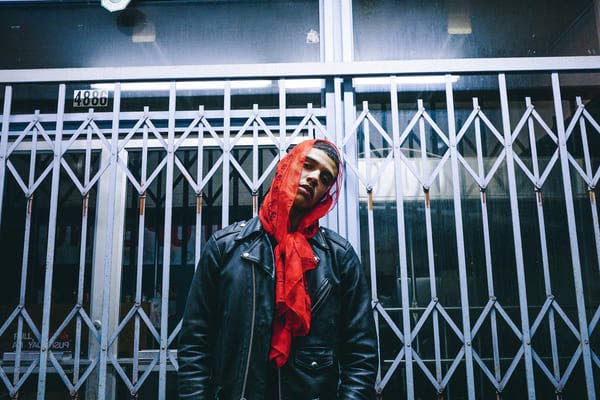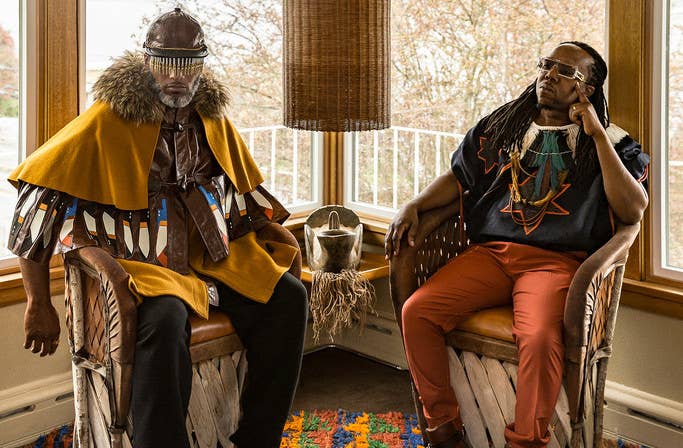
By Daniel Schwartz
Seattle’s reputation as a progressive haven belies its sordid racial history; redlining, the discriminatory practice that denied people of color access to loans, mortgages, and the right to buy property in white neighborhoods until the 1960s (and beyond), confined the city’s black population to a neighborhood east of downtown called the Central District.
For 75 years, the Central District served as the center of black life in Seattle. This is no longer the case. In recent years, the neighborhood has undergone rapid gentrification, and soaring property values have sent the majority of its black inhabitants south to find more affordable housing.
Sub Pop, the Seattle-based indie label best known for helping launch the careers of grunge bands like Nirvana and Soundgarden in the late ‘80s and early ‘90s, has made room in recent years for two hip-hop outfits from the Central District who are documenting their neighborhood’s history, people, and dramatic upheaval from divergent viewpoints.
In 2009, Sub Pop signed Shabazz Palaces, the duo comprised of former Digable Planets frontman Ishmael Butler (a.k.a. Palaceer Lazaro) and multi-instrumentalist Tendai Maraire. In 2013, they brought on Butler as an A&R, and the next year, he orchestrated the addition of his padawan, Porter Ray, to the label’s roster.
Earlier this month, Shabazz Palaces released two albums: Quazarz: Born on a Gangster Star and its "extra-spatial twin,” Quazarz vs. The Jealous Machines. These albums are experimental and Afrofuturistic, conceived in the spirit of Sun Ra. Butler offered the following mission statement/origin story for Born on a Gangster Star: “In the era of Quazarz youth, The Central District of Seattle, Washington shone wildly vibrant and pulsed strong like the muscles of the heart… from that glorious epoch there remain few vestiges... I’m one of them.”
In March, Porter Ray released his debut album Watercolors, an impressionist remembering of his youth roaming the streets of the CD and the tragedies that have plagued his life: the death of his father by multiple sclerosis, his younger brother Aaron by gun violence, and the mother of his child by car crash.
Butler, 48, and Ray, 28, represent two generations of perspective on Seattle hip-hop. They recently spoke to us about their special artistic bond, their appreciation of the Central District, and the city’s potential to influence hip-hop outside the Northwest.

Being Seattle natives releasing music on Sub Pop, how do you guys feel your music reflects Seattle culture, the landscape, and the Central District?
Ishmael Butler: When I grew up and where I grew up, it was a smaller community, not as big as it is now. So the Central District was almost like being in a southern town where everybody knew each other, everybody knew each other’s parents. We were like second or the third generation up here so it was very community-based. The neighborhoods were full of kids. It was a lot of activity, kids playing outside, going down to the community center and all kinds of stuff like that.
So, all of the people that I grew up around were very… everybody’s parents, grandparents came from somewhere else so they were like explorers and frontiersmen, people that were curious about the world and then moved up here almost sight unseen, or for a different opportunity in life to see something different. So all of us were cut from that same curious, exploratory cloth—all my peers were funny, smart, daring and courageous and adventurous. The people I was around cultivated that spirit in me. I got the notion that the world is out there for us to be a part of from my neighborhood and the people I grew up around.
Cats here [in Seattle] can get it in in a very elite way and it’s world class in my opinion.
Porter Ray: I would say the same. You know I’m like a generation under Ish but my grandparents moved here from Arkansas and my mom too. Growing up here, there was a very close knit community like Ish was saying. So, I grew up being exposed to different cultures, different friends of different shades, different colors, different household incomes as well but also being able to feel I could be creative and be articulate.
Then Ishmael himself was influencing me to get even more creative and not be ashamed of my creativity. The Central District that was my whole world growing up. I wasn’t really going to the North or South. It was like my vacation to go out to the North End, or maybe take a trip to the South End or to West Seattle. Those were like foreign places. My whole world was dominated by the Central. How I talk, how I dress, how I act or approach women, what music I would listen to is all a product of my environment growing up in that neighborhood. And before it got gentrified.
I feel like the Seattle hip-hop scene is kind of a curious beast. What are your thoughts on how it has evolved, in the last 10 years for Porter and longer for Ish? How do you evaluate the state of it in 2017?
I: I wouldn’t evaluate it because I’m a part of it. I’m active in it and I’m a contemporary so I’m not looking at it from outside. And I feel like that’s where you've got be in order to evaluate something. Because when you’re in it you're part of an energy and a movement that isn’t really reflecting on itself. That being said, I like the energy, I like the people who are involved. I’m kind of on the periphery of it because of my age. I'm not really always involved and participating in a lot of the shows and a lot of the stuff that’s going on. But, I’m down with a lot of the people who are and I like it. I like the camaraderie, I like the way it feels.
IT FEELS LIKE WE ARE AN UNTAPPED RESOURCE AND THERE IS A RICH HISTORY OF HIP-HOP HERE IN SEATTLE. - PORTER RAY
P: Yeah I like what Ish said about not wanting to evaluate it because he’s in it and I feel the same way. But what I will say is that it feels like we are an untapped resource and there is a rich history of hip-hop here in Seattle. There are cats that have been around for decades before me and I still feel that the Northwest is an untapped resource for hip-hop and especially as a hip-hop scene.
That’s really exciting to be a part of. There is a vast history within and there is a lot of rich talent around us and it’s just exciting to be trying to spread the name and just represent for the Northwest. Especially with the rest of the country being so well known for their hip-hop and their rap music.
I: In any sort of lane of hip-hop, any kind of sub-genre or style of hip-hop that’s going right now, there are many people that we have, that live here, that make hip-hop that can compete on world class level. Actually in my mind, they're comparatively better and have more passion then a lot of the stuff that is popular right now. I don’t care if its trap rap or whatever you want to say. Cats here can get it in in a very elite way and it’s world class in my opinion.
When I hear some of the stuff that’s coming out of here I’m amazed, but at the same time like I said all the cats I hung out with was really fly. Like witty, imaginative, with had their own personalities and style that they had really reconciled at a young age. I didn’t really see that when I traveled to other places. Not to the degree that it was here. It’s a special environment.
And yeah, it is an untapped resource but it’s also like a secret jewel. A lot of time the world don’t—I don’t want to say they’re not ready but people are not gonna bend over to just fit in. They would rather be their own self and let things come to them rather than try to conform and “make it out” you know what I’m saying? It’s just a matter of time. I like the backbone, I like the strength and the muscle that we show when we make our choices about what to do in life.
Other than yourselves, what are a couple other artists on the newer end that you think could represent Seattle in that outside the box manner of thinking and become known and acclaimed on a national and global scale?
I like the backbone, I like the strength and the muscle that we show when we make our choices about what to do in life. - ishmael butler
I: I mean like Stas[Stasia Irons, formerly of THEESatisfaction], a producer, MC, radio host, is still on the rise. Then the mainstays around here like Nacho Picasso, Royce the Choice, to me they’re world class. Then cats that people don’t even know about like Astro King, or a Bruce Leroy, or shit like that. Cats that are incredible at making music and then they have all these other disciplines and other types of artistic endeavors like films or paintings or directing—it’s just crazy. I’ll let P name some people too but it’s just crazy how diversely talented motherfuckers out here really are.
And it helps because when you know all these people are out here, and you go to make your own music you know they challenge you to really come and have some power. Because everybody is looking at you, and not just in a critical way, it’s the energy of the city. Like, "What’s this person doing?" "Yo, you heard what this guy is doing?" It makes the wave go tidal. It makes it bigger and you surf on that whether you acknowledge it or you know it or not. You feed off of all that energy so its live as fuck.
P: I would say the same people. Stas THEE Boss, Astro King Phoenix, I would say O C Notes, Silas Black, Vitamin D and the cats with Tribal Productions. Jar D, DoNormaal, Gifted Gab, so many different MC’s. Male, female MCs who are coming with a multitude of styles. There are so many different cats with their own styles, all of us creatively competing with each other. For all of us to be in our own lane, I think that also speaks to what Ish was saying about people coming from all over and moving to Seattle. Everybody got their own style, there’s not really a concrete sound from Seattle. There are so many different sounds that people create—and they're just really pushing the envelope.
Can you guys share the history of your relationship? How you met and your history as friends, musical partners, and admirers of each other.
P: Ish, I wanna hear you talk cuz they always asking me how I know you. [Laughs]
I: I’m an old man so my memory may be a little fallible. I used to see the brother around town and he’s an impressive young person and a figure. Tall, and actually got a cool vibe to him I was aware of who he was. A man named Maikoiyo Alley-Barnes, who’s also a Seattle luminary, had this spot that he had called Punctuation on Capitol Hill. I believe I met him there. I remember P was working there at the desk something like that.
He asked me if I had any photographs of Digable that weren’t published already because he was working on a shirt or something like that. We talked about that, then it turned out he lived right around the corner from where me and my kids lived so I would see him on the block sometimes. We always had a cool rapport. I didn’t know he rapped for years after I met him. Then my man Maikoiyo hit me with some of his early work and when I put two and two together I wasn’t shocked but I was pleasantly surprised. It went from there, we started just hanging out and when we would see each other we would have good conversations.
It was clear that he was somebody I could look to as a friend and had good information and a good rapport and good way about him. So that’s the way I remember it.
P: Yeah That’s exactly what happened. Honestly.
I: Okay, good. [Laughs]
P: I mean this guy, he’s a living legend in our city. Back then I was working at this spot I never tried to kick him no rhymes or nothing like that. Then just from being around and starting to chop it up with each other and getting to know each other and from him being somebody who I looked up to we started developing a friendship just out of mutual respect for each other.
I mean this guy [Ishmael Butler], he’s a living legend in our city. - Porter Ray
Again, Maikoiyo Alley-Barnes is the one who plugged Ish with my music. Then from there we started to talk more about music and creating music. Ish was helping me, he helped me with my first performance. I think we had a 15 minute segment opening for Royce the Choice. He was kinda just giving me tips on my performance and things like that. Creatively, he started to just give me jewels, leave me little bracelets that I could hold on to and then eventually he gave me the opportunity to actually put out some music with Sub Pop.
Around what time did you guys meet? Just so we can get a little of the timeline.
P: This is moreso like '07 probably, '08 or something like that. Yeah Around that time, between-
I: It was before Shabazz became one.
I didn’t realize it went that far back. Porter can you remember a couple of those jewels of wisdom that Ish has shared and then Ish can you talk about what you learned from watching this younger artist develop?
P: I think it was before my first public performance, Ish would tell me that on stage there ain’t no mistakes, you just, create. When you’re up there you’re just creating. There doesn't have to be this box in that you rehearse and now you think you have to stick to your script. There's no script like that when you on stage man just feel it, have fun and just create.
He's told me that there have been times when he fucked up on stage and then he’s freestyling and now he’s spitting the nicest shit that has ever come into his brain. Then they go in, then they start jamming, it just goes into something—a whole new set of music that is un-rehearsed that you couldn’t ever hear nowhere else. That has always stuck with me in terms of my confidence on stage. I'm up there having fun, doing what I'm meant to do and that as long as I’m aware of that it would be good. That’s for my performance.
And then I remember when we was recording my album I asked Ish to get on there and say some things and maybe drop a rhyme. He told me if I didn’t like the rhyme or if I didn’t like how he said something that I should take it off, and that it didn’t matter that it was him, Ishmael, who I see as this legend. However I want my music to come out, I have to take it and hold that in my hand.
That stuck with me too in terms of creating and being comfortable with my art or even just how I want my career to go or what decisions I make. They're my own decisions and I don’t have to hold that back for nobody. I really respected that and appreciated both of those jewels.
I: I feel like the place where we come from, Central District, Seattle, Washington and all the other hoods have never really been historically chronicled in the proper sense. I mean grunge in that era did it sonically and I feel like my music is an abstract expression of that. But I feel like Porter has actually told that story, in a very traditional African sense of keeping an oral history alive.
His observation and his ability to recall things and then add color and senses to it is powerful. Then to say it in such a floral and dope style of rap is, to me, the definitive history of our hoods. You can take the stories that he told, lift them up, take the names out, and put them down in my epoch of time and a lot of it will fit. It’s really this story of us, our people, our neighborhood, our streets, the places that we hung, the legends that came through—our times. I’m proud of being a part of that with him and I think over time the weight and the meaning of our city is going to get deeper and deeper and spread out to the world. That’s something that always sticks with me and I think about him in that way.
[Porter Ray's] observation and his ability to recall things and then add color and senses to it is powerful...to me, the definitive history of our hoods. - Ishmael Butler
Also, a cat doesn't have to be older than you to influence you or to teach you something or to challenge you. It’s so good that you then go back in and work on your own bag, your own tool kit. You have to always pay attention and have a childlike outlook because you don’t want to get vengeful and think, "Oh my era was a cool era and that’s the golden age." Then you only look back to that era for what’s quality and what’s good. So he exemplifies that there are a lot of jewels here these days. If you’re open to it you can learn from it.
Ish you had these mission statements around the new albums referring to the way Seattle is changing. You say, “In the era of Quazarz’s youth, the Central District of Seattle shown wildly and vibrant and pulled strong like the muscles of the heart,” and then it finishes “fact is from that glorious epoch there remain few vestiges, I am one of them.” I know the city is getting gentrified at a really quick pace but what are the few remaining vestiges that you see as central to the identity and the heart of city?
I: Well it’s not getting gentrified, it’s beyond that point. There are very few stores or hang out spots, even the things that are there from before have really transformed into the new mold, and the new people, and the new mentality, and the new practices. There's not really much left but what I will say is that the attitude, the blood, the strength that made us all who we are—I still see it when I come around those guys, come around the young boys and see how they get down; listen to the things they make.
So, those are the vestiges that I still see, but physically it’s just very different. There's not really much left but I don’t cry about that because things change. Those of us that do know and remember, we hold tight to it. So, to reiterate about P and his music, it keeps that alive in a literal way and an abstract way, in a physical way and a spiritual and symbolic way. It’s not that he's unconscious of it, but its more of a instinct, more an instinctive talent which to me is a higher intelligence, something that is not taught in schools.
P: Thank you man. Like Ish said, it looks so different, it feels different, it smells different. I feel like a foreigner when I’m in the city and I’m looked at as a foreigner. The whole energy is different, how we talk, how we dress, the way we move, the way we dance, the way we rhyme that’s all, all of that flavor we brought.
I feel like a foreigner when I’m in the city and I’m looked at as a foreigner. - Porter Ray
Like Ish said in the beginning, a lot of our family ain’t originally from Seattle, so we’re going to take our flavor wherever we go. A main thing that made me want to rhyme was capturing and trying to immortalize my friends' style. Seeing how dudes like Ish and his generation drive their cars, how they look while they're driving, and everything that they do. I tried to immortalize their whole aesthetic and its still there when I see my friends whether we’re in the city or not. They still have that vibe and it’s always going to be something that’s present in our music. When I’m hanging with my homies the Central District feels very much alive. It’s just not in that location anymore. But the style of it and the spirit of it is still within our music. Me and Ish especially.
I: I agree with that. The people we grew up with and raised us were very unique people. It’s not talked about, there is no written history of this stuff. It’s very traditional in the sense that we don’t really fuck with these sort of European notions of history and chronicling things and you write this down and one person tells the story. We got an oral tradition, and a stylistic tradition that we keep going and once we reconciled the fact that the turf wasn’t going to be there, we figured, okay then we're going to be here.
We are the earth, we are the living Central District and it ain’t nothing that we speak about, or talk about or sat around and plan, but it’s definitely an action I see. And when you see it, its recognizable off the jump and also easily recognizable when it’s not there at all. We keep it moving, keep it going, it's strong.
Shabazz Palaces' two new albums 'Quazarz: Born on a Gangster Star' and 'Quazarz vs. The Jealous Machines' and Porter Ray's 'Watercolors' are all out now via Sub Pop. Listen in full below.

